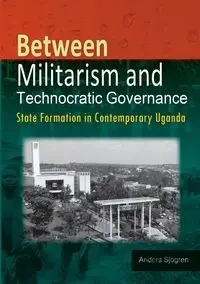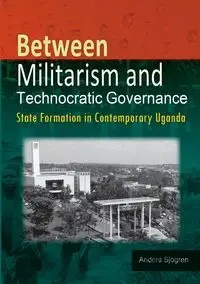Between Militarism and Technocratic Governance. State Formation in Contemporary Uganda - Sjogren Anders
Between Militarism and Technocratic Governance. State Formation in Contemporary Uganda - Sjogren Anders
AutorzySjogren Anders
EAN: 9789970251506
Symbol
897GQC03527KS
Rok wydania
2013
Elementy
312
Oprawa
Miekka
Format
14.8x21.0cm
Język
angielski

Bez ryzyka
14 dni na łatwy zwrot

Szeroki asortyment
ponad milion pozycji

Niskie ceny i rabaty
nawet do 50% każdego dnia
Niepotwierdzona zakupem
Ocena: /5
Symbol
897GQC03527KS
Kod producenta
9789970251506
Rok wydania
2013
Elementy
312
Oprawa
Miekka
Format
14.8x21.0cm
Język
angielski
Autorzy
Sjogren Anders

State-civil society relations in Africa have during recent decades been transformed in the context of economic liberalisation and state reform. This study explores state-civil society relations in contemporary Uganda, from 1986 to the present, in order to illustrate and explain the scope for and capacity of different social forces to create access to and democratise the state. The study interrogates state-civil society relations under the incumbent National Resistance Movement government as these are expressed through forms of interest representation and conflict regulation in different political arenas. It analyses this problem through an empirical study of the health sector at both national and local levels. Changes in the health regime - the rules and practices that regulate health politics - are analysed by a historical reconstruction of how different health regimes evolved from demands from social forces on the colonial and post-colonial state, in relation to broader patterns of political change. The ruling political coalition from 1986 has promoted a model for capitalist development based on donor-driven economic growth, institutional reform and political monopoly - what is referred to in the study as technocratic governance. Throughout, however, the technocratic tendency has been shaped in relation to the political economy of militarism as a more openly repressive form of authoritarian rule. The study argues that limits to democratisation of state society relations within the health sector and of Ugandan politics at large are best explained by relations of domination in society, within the state and among external political forces. The main conclusion is that democratisation of the state has been resisted by ruling groups,and therefore restricted.
EAN: 9789970251506
EAN: 9789970251506
Niepotwierdzona zakupem
Ocena: /5
Zapytaj o produkt
Niepotwierdzona zakupem
Ocena: /5
Napisz swoją opinię

